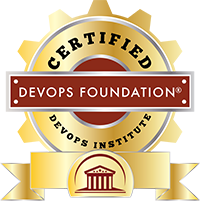
DevOps Foundation (DOFD)®
As organizations are facing new entrants in their respective markets, they need to stay competitive and release new and updated products on a regular basis rather than one or two times a year.
The DevOps Foundation course provides a baseline understanding of key DevOps terminology to ensure everyone is talking the same language and highlights the benefits of DevOps to support organizational success.
Learners will gain an understanding of DevOps, the cultural and professional movement that stresses communication, collaboration, integration, and automation to improve the flow of work between software developers and IT operations professionals.
- 2 Days
- Foundational Level
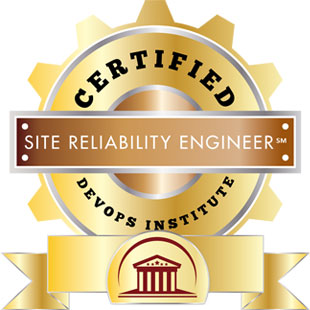
SRE Foundation (SREF)℠
The SRE (Site Reliability Engineering) Foundation℠ course is an introduction to the principles & practices that enable an organization to reliably and economically scale critical services. Introducing a site-reliability dimension requires organizational re-alignment, a new focus on engineering & automation, and the adoption of a range of new working paradigms.
The course highlights the evolution of SRE and its future direction, and equips participants with the practices, methods, and tools to engage people across the organization involved in reliability and stability evidenced through the use of real-life scenarios and case stories. Upon completion of the course, participants will have tangible takeaways to leverage when back in the office such as understanding, setting and tracking Service Level Objectives (SLO’s).
- 2 Days
- Intermediate Level
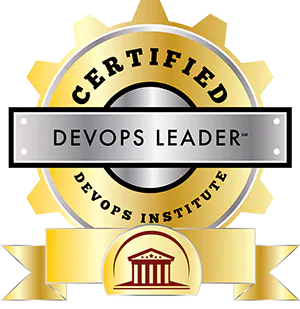
DevOps Leader (DOL)®
The DevOps Leader course is a unique and practical experience for participants who want to take a transformational leadership approach and make an impact within their organization by implementing DevOps. Leading people through a DevOps evolution requires new skills, tools, innovative thinking, and transformational leadership. Leaders up, down and across an organization must align and collaborate to break down silos and evolve the organization.
The course highlights the human dynamics of cultural change and equips participants with practices, methods, and tools to engage people across the DevOps spectrum through the use of real-life scenarios and case studies. Upon completion of the course, participants will have tangible takeaways to leverage when back in the office such as understanding Value Stream Mapping.
The course was developed by leveraging key DevOps leadership sources to extract real-life best practices in leading DevOps initiatives and has been designed to teach the key differences and emerging practices for DevOps ways of working through leadership in a fast-paced DevOps and Agile environment.
- 2 Days
- Advanced Level

DevSecOps Engineering (DSOE)℠
As companies are pushing code faster and more often than ever, the rate of vulnerabilities in our systems is accelerating. As we are being asked to do more with less, DevOps has shown immense value to business and security as an integral component that needs to be integrated into the strategy.
Topics covered in the course include how DevSecOps provides the business value of DevOps and the ability DevOps has to enable the business and support an organizational transformation with the ultimate goal of increasing productivity, reducing risk, and optimizing cost in the organization.
This course explains how DevOps security practices differ from other security approaches and provides the education needed to understand and apply data and security sciences. Participants learn the purpose, benefits, concepts, and vocabulary of DevSecOps; particularly how DevSecOps roles fit with a DevOps culture and organization. At the end of this course, participants will understand using “security as code” with the intent of making security and compliance consumable as a service.
- 2 Days
- Intermediate Level
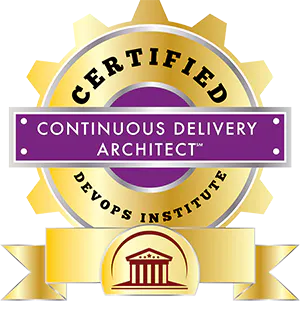
Continuous Delivery Architecture (CDA)℠
This course is designed for participants who are engaged in the design, implementation, and management of DevOps deployment pipelines and toolchains that support Continuous Integration, Continuous Delivery, Continuous Testing and potentially Continuous Deployment. The course highlights underpinning processes, metrics, APls and cultural considerations with Continuous Delivery.
Key benefits of Continuous Delivery will be covered including increased velocity to assist organizations to respond to market changes rapidly, thus being able to outmaneuver competition, reduce risk and lower costs while releasing higher quality solutions. Increased productivity and employee morale by having more activities performed by pipelines instead of humans so teams can focus on vision while pipelines do the execution.
- 2 Days
- Intermediate Level
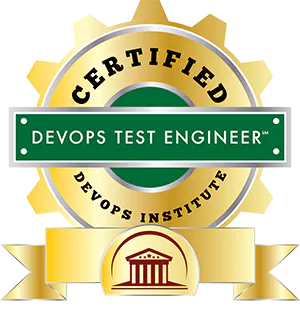
DevOps Test Engineering (DTE)®
This comprehensive course addresses testing in a DevOps environment and covers concepts such as the active use of test automation, testing earlier in the development cycle, and instilling testing skills in developers, quality assurance, security, and operational teams.
The course is relevant for every modern IT professional involved in defining or deploying a DevOps testing strategy for their organization, as test engineering is the backbone of DevOps and the primary key for successful DevOps pipeline to support digital transformation.
Actionable and exciting exercises will be used to apply the concepts covered in the course and sample documents, templates, tools, and techniques will be provided to leverage after the class.
- 2 Days
- Intermediate Level
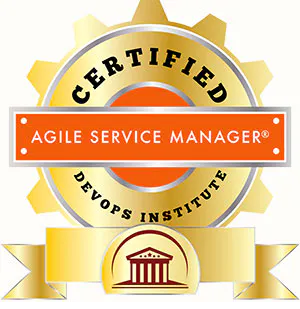
Certified Agile Service Manager (CASM)®
This course provides an introduction to Agile Service Management, the application, and integration of agile thinking into service management processes and process design projects. Agile thinking improves IT’s effectiveness and efficiency and enables IT to continue to deliver value in the face of changing requirements.
As Dev and Ops have been working in parallel with Dev focused on Agile/Scrum and Ops focused on ITSM/ITIL, this course strives to bring together individual achievements to deliver full business value. The course cross-pollinates Agile and ITSM practices to support end-to-end Agile Service Management so Dev starts to manage services instead of products and Ops and ITSM become more agile by scaling to “just enough” process leading to improved flow of work and time to value.
Agile Service Management helps IT to meet customer requirements faster, improve the collaboration between Dev and Ops, overcome constraints in process workflows by taking an iterative approach to process design that will improve the velocity of process improvement teams to get more done.
- 2 Days
- Intermediate Level
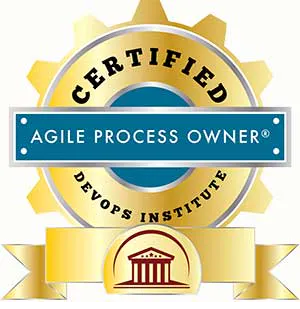
Certified Agile Process Owner (CAPO)®
This course provides guidance into the process Owner responsibilities so they can describe what they are doing as a process and provides the education needed to oversee the design, re-engineering and improvement of IT Service Management (ITSM) processes; particularly in the context of Agile Service Management. Participants learn how to apply Scrum practices to Process Owner responsibilities and use Agile and Lean principles and practices to put in place ‘just enough’ process and how to continually align process performance with overall business goals.
A process owner is an individual accountable for the performance of a process and for ensuring the process delivers value to its stakeholders. Process owners manage the requirements of process stakeholders, translate those requirements into process performance objectives, and oversee the entire process design and improvement lifecycle.
- 2 Days
- Advanced Level